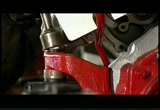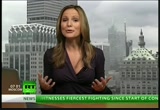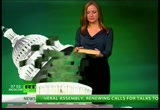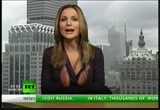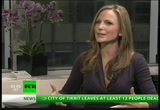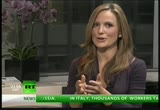tv [untitled] September 28, 2012 11:00pm-11:30pm EDT
11:00 pm
good afternoon and welcome to capital account i'm lauren lyster here in washington d.c. in our studios me in new york what am i talking about these are your headlines for friday september twenty eighth two thousand and twelve so bank of america announced today that it will pay two point four billion dollars to settle a class action lawsuit whish shareholders regarding the opposition of merrill lynch during the financial crisis now do you remember this deal looking back this is what
11:01 pm
our guest today wrote about it she wrote an article calling it the deal from hell hole what heidi moore reminds us of the legacy of the financial crisis still being worked through today at too big to fail banks like bank of america and what may be the deal for health for from health first shareholders not to mention employees plus trying to decipher the mysticism behind the markets wall street traders might be looking to resources like this. i want to be big maybe the hope that wall street traders hope the markets will deliver in terms of their profits and we will hear about how wall street treat traders are looking to the mystics to get ahead and also take a look at the scenery take a look at central park we hopped on to a horse drawn carriage dimitri and i to channel the rich and talk about what
11:02 pm
francoise whole lawns of new taxes mean for them they're going for seventy five percent in the new budget let's get to today's capital account. the financial crisis is still with us today it may have been four years ago but it's left a massive hangover in the banking system still being felt by taxpayers many americans and also shareholders and some of these banks and employees in the form of layoffs and it comes to us today a reminder in the form in evidence in news revolving around this bank bank of america so the bank announced it will pay shareholders two point four billion
11:03 pm
dollars as part of a settlement this is over the acquisition of merrill lynch back in two thousand and eight the evidence suggests that bank of america knew that it was taking on greater losses than it let on and inform shareholders and now the bank admitted no wrongdoing i should mention but before we get into the settlement let's look back at what was in tailed in this deal and to do that we have a reporter who was covering it then and she's covering the financial system now we spoke with heidi moore she is the new york bureau chief for marketplace also there wall street correspondent take a look. looking at what you are writing then there is a headline in the wall street journal from your article saying this is the deal from hell the fifty billion dollar deal for mel so let's go back to remind everybody what this deal was and what the controversy was surrounding it the feeling at the time was you know there were so many disasters related to the deal from the moment it was announced that it just felt like what's next locusts like you know like you know what biblical plagues are due upon bank of america next so if you remember the whole deal happened because bank of america was supposed to buy
11:04 pm
lehman brothers and then merrill lynch a c.e.o. swooped in and said hey if you're going to buy an investment bank by us and of course you know lehman failed that weekend because bank of america didn't buy it but then once bank of america bought merrill lynch the deal was done in forty eight hours it was really sloppy they overpaid for it you know the merrill share price was seventeen dollars a share and merrill paid twenty nine dollars a share so just from the beginning this was a really rich deal for a struggling bank and a lot of shareholders thought why are you paying so much and at the same time bank of america stock price fell twenty billion dollars in only two trading days so they were feeling the pain right away they might have been able to look past that if it hadn't come out within a matter of months that merrill lynch was sitting on seventy billion dollars of losses in credit default swaps and things like that and the shareholders thought you guys were supposed to investigate this deal you didn't investigate it you
11:05 pm
bought a bank with billions of dollars of losses now you have to take money from the treasury hundreds of billions of dollars of support from the treasury and backstops where did you when did you think you were going to tell us and so the shareholders were really outraged at the way the deal was done the way information wasn't disclosed and just the bad governments around the whole thing the bad way it was run right and let's bring in the context of government intervention at that time because doesn't the story kind of go at least what a lot of people believe that hank paulson and have strong arms can listen to this deal or there was some. uncertain surrounding the way it was done maybe the pressure that was put on they really wanted regulators knew that lehman brothers was probably going to fail and they didn't want another investment bank to go down at the same time so there was significant pressure from washington if you're going to do this deal you're going to have to get it done and it probably accounted for why a bank of america felt it was ok to pay so much money but also you know the other side of that is that bank of america had
11:06 pm
a significant amount of hubris at the time they had done a few acquisitions and they felt like they were really successful at it they thought they knew how these things worked and so they didn't do the kind of homework that they thought they should have done more importantly they didn't do the kind of disclosure that they should have done i mean when you're buying a company that potentially has seventy billion dollars of losses on its books or even thirty billion at the time because the losses kept growing that is something your shareholders need to know and bank of america thought it's the financial crisis everyone's worried about every other bank and their survival people worried that the government would have to take over big banks like bank of america and city and they swept it under the rug and there is some there were some suggestions that they had kind of an implicit ok for that from the government because who wants bank of america to suffer on top of everything else that happened at that point right everybody wanted these banks to survive to the extent that they could in so sketchy things are being done so let's fast forward and this legacy is still working itself
11:07 pm
out so what is your reaction to the this proposed settlement is this going to air or wrap it all up with a nice bow is this a bad deal for shareholders a good deal it's i think it kind of it does wrap it up with a nice bow i mean it's a really small amount of money compared to what shareholders may have lost during that time during the financial crisis now the benefit is that bank of america is in decent standing at least merrill lynch turned out to be a pretty decent acquisition and it all kind of worked out in the end but compared to the money that you know she. holders lost that two point four three billion dollars doesn't even begin to cover it especially on an individual level and you know and very much so also for big institutional investors who thought you know bank of america was this big safe stock to be in and all the sudden you know you see this kind of seedy way of doing business of not telling your shareholders what you're up to and that you know that casts doubt about how these banks are run you
11:08 pm
know which we still haven't really resolved obviously bank of america's new leadership now but you know but it just shows that during a crisis people are going to be willing to lie to save their hides you know and if they're going to pay two point four three billion dollars for it four years down the line that doesn't feel like a huge penalty for lying about you know seventy billion dollars of c.d.o. losses you know right so do you think that this is a reminder of exactly that that you really you know there isn't much compensation for the people that get hurt in these deals and in these shady dealings by a major bank yeah exactly i mean it's really hard if you're a shareholder to hold those banks to account and you never could have done enough homework to know what was going on the only reason we know what happened in that deal is because of government subpoenas this this information came out through you know various inquiries and subpoenas and things like that and so even if you were a shareholder and you had done your homework on merrill lynch and you had done your homework on bank of america you couldn't have seen that amount of losses coming and
11:09 pm
that's really scary because that's big so it's about the transparency of the financial system yeah and do you think that's been fixed today or do you think it's exactly that would be exactly the same if we had this again i think human nature is human nature i mean look at how long j.p. morgan waited to announce the london whale loss right i mean people were saying this big loss on derivatives is coming to j.p. morgan and there were articles about it for nearly a month before the bank finally said finally owned up to it and luckily luckily that wasn't a crisis level situation but it does show that the first. instinct at a bank when there's a crisis is let's try to deal with this internally let's try to fix it and during that time regulators don't know about it shareholders don't know about it and they often get slapped with sort of a larger tsunami of information and crisis because that information has been hidden by the bank for so long and you didn't see it coming right and just in terms of you know that you saying this is
11:10 pm
a relatively small settlement for shareholders is it material to bank of america i know they said with some other things they expect earnings to be lowered twenty cents or something is this something that is material from the bank i mean you know they'll easily overcome it i mean it's material enough that they'll be they'll have to announce it in earnings but it's i mean they can easily overcome something like that if you think about the fact that just for the bad mortgages that bank of america has they're paying two billion dollars every quarter just to service those bad mortgages you know this one point six billion dollars charge that they're going to end up taking is you know really small in the context of a bank with you know hundreds of billions of dollars and that's right and to carry on with bank of america let's just stick to this is an example you said that merrill lynch at the end of the day ended up being somewhat of a good deal countrywide not so much and you did a story on the layoffs at bank of america that they announced a while back thirty thousand and how they're actually speeding those up for going
11:11 pm
to get through them quicker than expected maybe. is this another legacy of the financial crisis is this the countrywide acquisition do you really think it's impacting the layoffs at the bank is taking now definitely yeah i mean that is the whole thing and it also came from that over confidence i was talking to people at bank of america this week about those layoffs and you know talking about how this countrywide acquisition could have happened if you want to talk about a deal from hell i mean they should have started building an ark the minute that the. deal because it was it was just again biblically wiped out all sorts of value bank of america but. because the bank had gone gone through acquisitions and grown through acquisitions they felt that they knew how this whole thing worked and that they could turn countrywide around obviously that didn't happen what happened was countrywide ended up dragging down bank of america and to this day i mean that it was only two thousand and seven i think it's five years later and bank for america still pain eight billion dollars a year to handle the fallout from that deal and you know they've tightened up on
11:12 pm
the way that they give out mortgages or trying to be far more responsible about that but you know. it just it shows how when a bank actually starts to think that it knows what it's doing when it thinks that it has that capability that nothing can surprise it they get into really stupid situations and they end up paying for it for years i mean we forget because there's no single reporter on the countrywide be any more but you know but like if you're running a bank you hear from your staff every day that you know you're still dealing with these problems from from five years ago and within the industry it's felt very keenly. and still ahead we'll hear from heidi more on the bigger picture of the financial crisis legacy being felt at all of the big banks more broadly and wall street astrology was in loose change we had to central park dimitri and i hopped on a carrier and just to talk about eating the rich as the protest logan goes to even
11:13 pm
11:15 pm
all right so before the break we covered bank of america but what about the financial crisis legacy how much of that is being felt more broadly in the banking system and how much has to be worked out still in the form of litigation or layoffs more with heidi moore marketplace wall street correspondent and new york bureau chief. so much i mean if you look at it i mean you can measure the losses there or
11:16 pm
the actual lawsuits or class action lawsuits and the potential charges they have to take on those that the banks have to take on those but really look at how much they've lost in their stock price look at how much they've lost in their book value when banks have lost so much value that sandy weill the father of big banks is saying they're not making enough money to survive anymore let's break them up then you know something has really gone wrong in the industry and the question is do they recognize it right i mean this is the big debate do people within the industry realize that it really does have to change or do they think that right now it's just kind of a cyclical moment things aren't so great and they'll be able to go back to making money in the same ways and with the same incentives that they had in two thousand and eight and that will tell you everything about the future of the banking industry what do you think is the answer to that just judging on the reporting that you do what do you think that people within the banking industry think because we have the sandy weill's but we have the jamie dimon saying bigger is better you know
11:17 pm
that's misguided right we'll say and i mean jamie diamond has to protect his stock price. god bless him because i mean if he came out and said anything other than what he said people would really worry but i but i think that there are an increasing number of people who are dissidents to the way that the financial system works i mean there are within the financial system but they're like this is not working and maybe it wasn't working before but they were able to make money from it like you could still push that engine forward and now it's kind of the gases out of it it's chugging it's barely chugging along and they're coming around and saying you know what maybe we should look at a different way of compensating people or a different way of setting incentives or a different way of looking at lending because what's obvious to probably the rest of the populace and maybe not to the people doing much of these shops is what happened before was not working you can't go back to that system and expect that system to be profitable and we were talking earlier about just how the financial media's role in this and. how the landscape has really changed in the sense that i
11:18 pm
think post financial crisis maybe there's more of a taste for investigative journalism into the banking industry and we've seen more blogs in the twitter sphere is exploded so how do you think that landscape has changed and how do you think that change is the information that we know we were talking about the merrill bank of america acquisition and you know would we have had more information synergy think now then we did then with subpoenas do you think that it would have come out in the twitter sphere or something that's you know i think that's a really interesting question i mean i have to say i don't see too much secret subpoena type information on twitter. i'm going i'm going to read or i want to read or what twitter is really good for is like you get information instantaneously so you know instead of i was at the wall street journal at the time of the financial crisis and i remember you know you could look at the dow jones news wires and see what was going on but really you had to have the dow jones newswires or the bloomberg wires or reuters at your desk if you were you know an average citizen you
11:19 pm
were not going to get a breaking news alert you know that lehman brothers had failed on sunday night like you'd have to go specifically to the wall street journal website or the new york times website so look for that whereas with twitter now you know within seconds every piece of information whether it's whitney houston's death to the bank of america settlement to you know q e three so obviously the speed of information is much faster and there's so much more there for you to look for but twitter is not an investigative tool. so i don't think it would have put us in that much better sort of a mindset to be able to understand what happened in the financial crisis because that is where investigative journalism where making the calls where digging deep helped a lot in setting some of the narratives before the subpoenas came in and even you know a lot of the reporting that was done at that time was really accurate and important before. government even started sending people into these banks to take
11:20 pm
a look at it and everyone at the you know elite reaches of banking and finance and government were worried that anything that they would do would topple the whole system over i mean it was reporters who were working hard to get that information out there and try to create the narrative that we still talk about of what just happened right and just because we're talking about how the banking system is changed profits falling all of this before we go our our trainer is the financial industry looking for ever more creative ways to get ahead because you wrote an interesting piece about astrology i mean when you yes that you know are these the measures that people need to resort to now to try to return to that era of profitability i want what's really funny about that story that story was so much fun to do and talking to people who are financial structures or who use financial strategy is it is not new. since the forty's and picked up a lot of popularity in the sixty's and then obviously in the seventy's with the
11:21 pm
whole sort of you know hippie era but what was really interesting was after the crash of one thousand nine hundred seven one of the astrologers told me that a whole bunch of hedge funds bought financial astrology software kind of on the down low and they didn't talk about it he doesn't know if they ever ended up using it but you know but you know people in finance write anything that gives you an edge it doesn't mean that they are going to be faithful to this one way of seeing things that they are going to you know check the fed's horoscope before making any of these decisions but as somebody told me you know a twenty eight year veteran of bear stearns told me if you're a trader and somebody tells you the market's going down in september and it goes down in september it doesn't matter who that person is you're going to go back and that's what's going to happen in november and not tell me what you see because you never really know i mean the market is almost in itself a mystic occurrence of mystic phenomenon and as you know one of the first things that i found out when i was a financial reporter and i had just started i would read. market stories i would
11:22 pm
say the market is up today because you know oil and afghanistan are like all these really elaborate theories and i was like wow people must be really hard to. understand how these geo political things cause a change in the dow no i don't know if i could ever write my mind around that of course you become a financial reporter and you realize basically everyone is guessing that it's not you as the reporter who's guessing it's also the people in the market who's guessing that everyone's taking the most plausible theory so if you look at financial strategy through that lens that you know it's just one more theory for them to go through then you know i wouldn't be surprised i mean they do have thousands of subscribers interesting things that bring in the mystic's regulators are just you know are the professionals doing much better now everyone's going to be mad at me for saying oh i forgot that part i'm just looking they so much i think you're.
11:23 pm
right we have a very special loose change today we are in the town area man out on a link here and right in central park merging to get a little look at the view part strong kerridge and we were looking to be used to a central park instead of a historical. little angle we have gone on with our lease changes and used to be this is the only way you could get into the park when. people came in the first ten years because the park is here mean there were no written one percent yes in fact they acquired it through everything to me and pushed out sixteen hundred working class for most of the immigrants out of this area the people realize that it was actually people lived here at the time was macbeth. you know it was built around
11:24 pm
the park it was that london at the time was the new yorkers up and coming and they wanted to find a way to compete with london because they had these really beautiful parks in london so what a new york to america and american very kind of culture. the biggest part of the world. so we're really living what it would've been like a day and a carriage i guess and it's also a good way to channel maybe what the super rich might be feeling in france right now which brings me to my next story because french law law and because france needs to rein in its deficits and debt to g.d.p. has now surpassed ninety per cent he's announced he's going to tax the super rich seventy five percent. temporarily. so i just think this is a funny switch because remember marie antoinette let them eat cake she was talking about the poor and the reverse this is the reverse this is like the lefty slogan eat the rich the rich people right or let them eat the me. what's so crappy bread for people i don't know. i mean wonder bread in greece now for going yeah but
11:25 pm
anyway whatever dry bread the point is it's kind of reverse is interesting i mean france and france is a kind of a. kind of that's all no one's horizons for the other no one's really talking about but john moulden who we interviewed said that that is the city to watch as the city in the country what kind of backlash ok so the rich is basically a lucky slogan saying if the poor get desperate they will eat the ranch but what do you think the backlash from the rich is going to be in france for being taxed seventy five percent the burden is on them to make up the shortfall in the budget deficit essentially no marmion a monetary taken any character i know you. know mitt romney is super rigid most of the i am but he gets taxed less than i do thirteen percent less of it to babylon and i don't know how this works or that's thing which plays yes on the rich are just raised on you know times reeking of eating i think there's an interesting story we're going to be yes there may be a solution for what the people that are. struggling to feed themselves congeal some
11:26 pm
new yorkers spearheaded it they found engine these are hunter gatherers pigeons according to them are an invasive species made it about to be fed because i don't see any and central park right around here world but you know pigeons bum rush wrestling yeah but why do you take a look at this little clip of what they did find and do with the pigeons that they found and stone in central park. to walk up the hill. so as you can see they killed two birds with one stone to the total police state they literally stone pigeons to show that they can both tackle and indecent species and feed people without them needing to purchase their food do you see this catching on dimitar do in fact there's a problem out will now and where you're not allowed to hunt deer i believe it's in the north fork in the south or perhaps well and you've got a huge group burgeoning deer population as it's just the strong everything over
11:27 pm
there and they should actually be a lot of people to hog and there's only a certain season augurs really needs a home with a bow and arrow i don't know why you don't you should we we have we have an epidemic. quick company bigger doors to work no more good very good i'm sorry to say a push from me ok the rumor i know for sure the rumor produced archer but any report is goods a good thing you do you do with the nature of these images and their hunger for people i wonder if there's any regulatory issues because i was kind of surprised you could just own pigeons in central park or you could stone room these are well known i mean we look at them but to bring up full circle back in the early days of central park there were actually laws regulations against certain things like your trains and bringing your commercial cart and which is how you drive through central park to a limited the people that were allowed to come basically and enjoy the park but now if you can actually in fact don't pigeons in the park i would say to massively bend to moscow it's fair game very green so maybe we should step off this character and
11:28 pm
their dad get back down to earth because that's about all the time we have for today's least change. seconds are right so that wraps up our week in new york conquering central park the financial system in times square to bring you insight from the center of the financial system in the u.s. at least but that's all we have time for so thank you so much for watching be sure to come back next week and in the meantime you can follow me on twitter at lauren lyster go out like us on facebook it's our new facebook page facebook dot com slash capital account that is the official facebook page i want to let you know because there are others out there you can also watch any show that you missed comment we will get to your feedback next week at youtube dot com slash capital account and have a great weekend. for
39 Views
Uploaded by TV Archive on

 Live Music Archive
Live Music Archive Librivox Free Audio
Librivox Free Audio Metropolitan Museum
Metropolitan Museum Cleveland Museum of Art
Cleveland Museum of Art Internet Arcade
Internet Arcade Console Living Room
Console Living Room Books to Borrow
Books to Borrow Open Library
Open Library TV News
TV News Understanding 9/11
Understanding 9/11